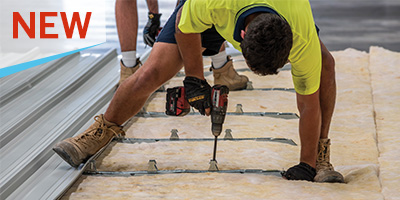Anticon Roofing Blanket
Acoustic, thermal and condensation control for commercial roofing
Anticon Roofing Blanket
Anticon is available with a range of facing materials to suit a variety of applications, including vapour impermeable options for condensation control.
Anticon Roofing Blanket
Acoustic, thermal and condensation control for commercial roofing
Anticon Roofing Blanket
Anticon is available with a range of facing materials to suit a variety of applications, including vapour impermeable options for condensation control.
Anticon™
 Create a spec with our thermal roofing calculator.
Create a spec with our thermal roofing calculator.Bradford Anticon™ is foil-faced insulation blanket specifically designed for temperature & noise control in homes and buildings with metal roofs.
It is comprised of a glasswool blanket adhered to an impermeable reinforced reflective foil facing. This reduces radiant heat entering a home during summer, and helps prevent condensation in winter.
- Overview
- Applications
-
Facing selection for your project
Manufactured and used in Australia for over 40 years, Anticon™ is available with a wide range of facing options to ensure the proper performance and appearance for your project.
This section provides basic guidance on product selection, please contact CSR Bradford for expert advice specific to your project needs.
Facing Selection
Facing Description Emissivity1 Condensation Control2 Aesthetics3 Acoustics4 Thermoseal™ light duty 729 An economical reflective foil. ✔✔✔ ✔✔✔ ✔ ✔ Thermoseal™ medium duty 730 A stronger foil with additional tear resistance. ✔✔✔ ✔✔✔ ✔✔ — Thermoseal™ heavy duty 750 Premium strength for a premium finish. ✔✔✔ ✔✔✔ ✔✔ — Acoustituff™ A tough, lightweight reflective foil facing that provides a combination of acoustic performance and condensation control. ✔✔✔ ✔✔ ✔ ✔✔ Antiglare Antiglare foil specifically designed to reduce condensation in humid environments, the Antiglare foil can also be installed in an upwards direction to allow installation in direct sunlight. ✔✔ ✔✔✔ ✔ — 1 Emissivity is the ability of a material to emit energy by radiation – the table above provides guidance to the degree that the facing material impacts the performance of the total system R-Value (RT) of the insulation blanket and facing material.
2 Condensation control – please note that only facings that are vapour impermeable are suitable for condensation control, which requires all lap joints and penetrations to be lapped and taped at installation.
3 Aesthetics refers to the visual appearance of the exposed roof after installation – the table above provides guidance to the visual appearance that can be achieved with the facing material based on typical installation conditions. Other application and installation conditions may affect the visual appearance of the roof.
4 Acoustic performance of the facing material assumes same base material. - Specifications


